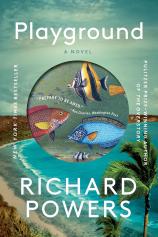Playground
Review
Playground
It is said that oceans occupy some 70 percent of the earth’s surface, but unless you live near one or pay an occasional visit, it’s unlikely they intrude often on your consciousness. That may change after reading PLAYGROUND. As he did in his Pulitzer Prize-winning THE OVERSTORY, Richard Powers has succeeded in infusing a deeply researched and immersive story about the natural world and the perils facing it with affecting human drama. The fact that he’s able to accomplish this so consistently in a career that now spans 40 years and 14 novels is a tribute to his considerable talent.
The principal locus of PLAYGROUND is the real-life coral atoll of Makatea, a “speck of green confetti” roughly nine miles in area in the Tuamotus, a chain of 70 or so islands in French Polynesia that’s home to 82 people in Powers’ fictional version. In 2027, a group of wealthy Americans want to make the island the base for a project to construct modular floating-city parts that will comprise a “seasteading” community. This isn’t the first time the island has been the object of resource exploitation. In the half-century preceding 1966, it hosted a massive phosphate mining operation that left it desolate after the supply was exhausted.
"As he did in his Pulitzer Prize-winning THE OVERSTORY, Richard Powers has succeeded in infusing a deeply researched and immersive story about the natural world and the perils facing it with affecting human drama."
Is this plan yet another link in the long line of colonialist incursions, or a beneficial visionary enterprise? That’s the question that the Makatea islanders will decide in a referendum that has sparked a lively debate among the small but distinctive cadre of residents that include the island’s beleaguered mayor and an octogenarian singer nicknamed the Queen.
But the project ultimately becomes the focal point in the lives of the four characters whose intersecting stories are central to the novel. Todd Keane, a “soldier for the digital revolution,” blends features of Elon Musk, Jeff Bezos and Mark Zuckerberg. The vast fortune he’s accumulated by inventing a wildly successful social media cum Sims platform called Playground that’s undergirded by a massive artificial intelligence infrastructure is overshadowed by the diagnosis of dementia with Lewy bodies he’s received in his late 50s. Much of his story is recounted in a lengthy first person narrative frankly taking stock of his life.
Born on the South Side of Chicago, Rafi Young’s life becomes linked to Todd’s when he receives a scholarship to an elite Catholic high school in Evanston that makes him one of the few Black enrollees. There, he and Todd bond over a mutual love of chess and later the insanely complex ancient Chinese game of Go in a deep friendship that is “built on play.”
Later, at the University of Illinois, Todd immerses himself in coding and is exposed to artificial intelligence in its early stages --- a subject to which Powers devotes significant thoughtful attention and that plays a crucial role in the island referendum --- and Rafi pursues his passion for literature. Rafi meets, and later marries, Ina Aroita, a native of Honolulu and an artist. The pair eventually settle on Makatea, where they raise two foster children. The falling-out that he and Todd have as Todd develops Playground has kept them estranged for decades, and the tension between the two men’s clashing visions of the world bubbles through the story.
The final member of this intriguing quartet is Evelyne Beaulieu, a Canadian marine biologist who falls in love with diving as a 12-year-old in Montreal after testing her father’s prototype for the first aqualung. Now, 80 years later, with a lifetime of “preaching the gospel of the oceans” behind her and long after writing a bestselling book that helped spark Todd’s interest in the oceans decades earlier, she has come to Makatea to make her final dive.
“A finite game is played for the purpose of winning, an infinite game for the purpose of continuing to play.” For all its serious stakes, that philosophy, from a book Rafi handed Todd when they embarked on their immersion into Go, becomes one of the driving forces of the novel. The notion of play infuses everything from Todd’s programming efforts to the sculptures Ina fashions from the deadly microplastics she retrieves from Makatea’s waters, some of which are recovered out of the bodies of dead wildlife. Powers describes Evelyne’s dives, especially ones surrounded by her beloved manta rays, in rapturous detail representative of the novel’s gorgeous ocean scenes.
“She felt like a babe in Toyland,” Powers writes about an early one, “set loose in the greatest playground any child had ever seen. She played hide-and-seek with octopuses and tag with pygmy seahorses. She reeled from the surreal stripes of colonial anemones. Her fingers teased the spreading nets of gorgonians. She did headstands to peer into the cracks and ledges at the base of corals, the hideouts of action-painted mandarin fish and elegant green eels.”
Whether the topic is AI, the plight of our oceans in a warming world, or the challenges facing inhabitants of developing regions who disproportionately shoulder the burdens of global capitalism, PLAYGROUND bears all the evidence of a writer who has reflected deeply on these issues. At the same time, as he considers timeless human dilemmas like ambition, friendship and loyalty, he brings to bear the skills of a mature novelist to present them in the thoughtful way that only the medium of fiction can provide. One couldn’t ask for more from a novel.
Reviewed by Harvey Freedenberg on September 27, 2024
Playground
- Publication Date: September 30, 2025
- Genres: Fiction
- Paperback: 416 pages
- Publisher: W. W. Norton & Company
- ISBN-10: 1324123737
- ISBN-13: 9781324123736




